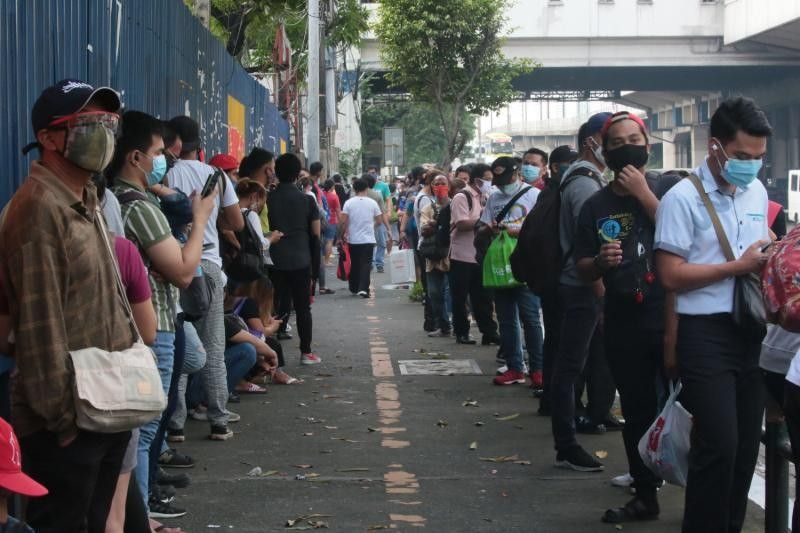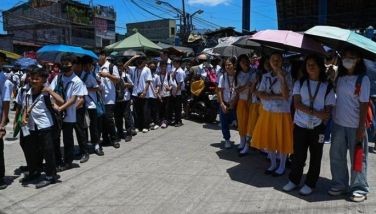Group appeals to gov't: Ensure stable public transport during ECQ

MANILA, Philippines — With coronavirus cases still rising, the government should learn from past mistakes and ensure the steady flow of public transportation as lockdown restrictions are slated to tighten once again, a coalition of transport experts and advocates said.
Starting Monday, the capacity of public transportation is set to be drastically reduced again under the enhanced community quarantine—a policy that does not bode well for the 88% of households in Metro Manila that do not own private vehicles.
In a letter addressed to ranking Cabinet officials under the Inter-Agency Task Force on the Management of Emerging Infectious Diseases, transport economist Robert Siy of the Move As One transport coalition appealed for increased public transport supply across all modes to ensure healthcare frontliners and essential workers are not impeded by the new quarantine classification.
"In the event of a lockdown or ECQ or MECQ, we urgently appeal to the government to ensure the safe, sufficient, and stable supply of public transport," the letter read.
"The shutdown of mobility services last year contributed to the worst recession on record and caused our people needless suffering. It was one of the factors that impeded the effort to flatten the curve."
The coalition in its letter proposed the following amendments to the national government's lockdown guidelines:
- Allow all public transport units to ply all routes and designate PUV-only lanes
- Promote active transport (cycling and walking) through protected bike lanes, wider pedestrian infrastructure, at-grade crosswalks, and green open spaces.
- Accelerate the implementation of the service contracting program and include health standards in the performance parameters of the service contracts.
- Empower local government units to co-implement and co-finance service contracting to show meaningful changes in focused routes and with organized transport groups
This comes after President Rodrigo Duterte approved the coronavirus task force's proposal to implement an enhanced community quarantine for the second time in an attempt to arrest the spread of the coronavirus in the Philippines.
The first ECQ saw a return of the familiar transport woes that commuter groups have long bemoaned in the country's public transportation system: long lines at train stations and carmageddon on major thoroughfares.
In the absence of transportation, thousands of Filipinos, some of them healthcare frontliners, were forced to walk to work or learn to bike in a pandemic that required social distancing.
"We should avoid making the same mistake again. If public transport is unavailable, most essential workers will be unable to get to their jobs. Shuttles will be overcrowded, exposing passengers to greater risks. Countless people will be stranded or will have to walk long distances to reach their destinations. This was the tragic experience of our people who took essential trips, such as buying groceries and medicine and going to hospitals, when the lockdown was imposed last year," Siy said.
"We must provide public transport for our health care workers so they can go to work and come home to their families safely, especially after shifts that often last more than 24 hours. Insufficient public transport leads to crowding and increased potential for spreading the virus. Current MECQ and ECQ rules disallowing buses, jeepneys, taxis, TNVS, trains, and tricycles, will mean fatigued health care workers, crowded lines and terminals, and a higher risk of COVID-19 transmission."
Other groups have urged authorities to allow more vehicles to ply their routes to offset the effects of decreased capacity, which they said would help ensure that passengers are following health protocols.
Even the Healthcare Professionals Alliance Against COVID-19 as far back as February called on transport authorities to decongest transportation through accelerated construction of pop-up bike lanes and wider at-grade walkways.
As of the health department's latest tally Saturday afternoon, over 712,000 infections have been recorded in the Philippines after health authorities recorded 9,595 additional COVID-19 cases—the second-highest daily rise in cases to date.
It has been 376 days since the enhanced community quarantine was first hoisted in Luzon. The Philippines is still under the world's longest lockdown.
"We stand with health care workers and essential workers calling for an adequate number of public utility vehicles and the adequate supply of vehicles that conform to health and safety standards to meet the round-the-clock demand for essential travel during ECQ and MECQ," the Move as One coalition said.
- Latest
- Trending
































